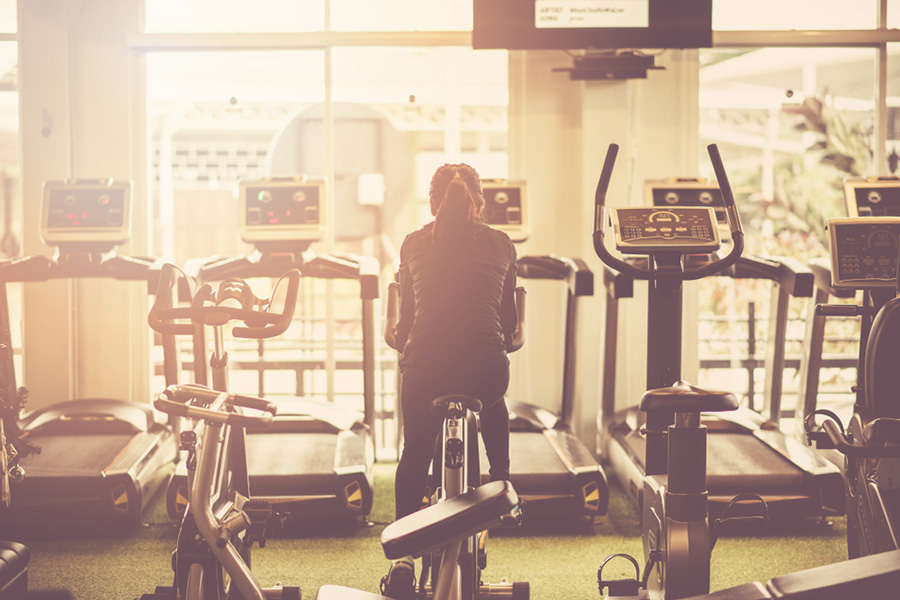Starting a new fitness routine comes with a lot of challenges. Self discipline and confidence is needed in many aspects of life, including when it comes to your health. Some challenges may show before you step into the gym. Gym intimidation comes in a number of forms and is always a big distraction. Whether you’re not sure where to begin or not where you want to be physically just yet, feeling nervous or uncomfortable in a gym setting is common.
If you’re stuck in the mindset that everyone will be watching you, judging your performance and knowledge, you’re not alone. But it definitely doesn’t have to be that way. The gym can actually be home to a supportive community that may be beneficial to your health and fitness.
Here are some helpful quick tips for beating gym intimidation.
More likely than not, when you joined your gym you got the grand tour of the place. You know the layout and what it has to offer, but get lost when it comes to what exactly you should do. From cardio to strength training, without a plan, the gym can feel like more like a stressor than stress relief.
Use a workout guide during your workouts. The are lots of apps like the Aaptiv and Jefit. These apps, along with a the many fitness YouTube channels, will give you ideas for types of workouts to group together and how to use good technique. They’ll also help you decide what type of exercise you like best. Then you can start to better plan your gym visits. Before you step foot in the gym you should have an idea of what you want to do and how long you want to do it (and, of course, factor in a warm-up and cool-down). This way you know what you’re in for ahead of time and won’t get bored. You also won’t stand around staring at different pieces of equipment.
If you don’t know how to use the machines or weights, which is common among beginners, here is what you should do: if you’re already at the gym and find yourself unsure of how to use something, ask an employee. They’re there to help you and keep you safe, which means they know the ins and outs of every machine in the place. Different gyms offer different versions of machines as well, so check with them to see how each specific one works.
I you feel lonely or singled out walking into a gym by yourself…
- Enlist a workout buddy to keep you motivated.
- Try a class. In a class setting, almost everyone’s attention is on the instructor, so you don’t have to worry about being singled out.
- Remember, Everyone started from somewhere.
- Music is a key factor to take your attention away from your surrounding and also as motivator.
- Wear the right sportswear
Want to go in with a good idea of how things work? We’ve got you covered. We’ve already gone into detail on each cardio machine. Here’s a quick rundown.
Treadmill: First, you’ll want to familiarize yourself with those buttons (starting with quick start and speed). Once that’s covered and you’re ready to get on, place one leg on each side of the belt, on the rubber strips. Press the quick start button, which will start the treadmill at its slowest speed (0.5 or one, in most cases). Step on the belt and begin walking at this speed, slowly increasing until you’re at a moderate pace. Feeling comfortable? Test higher speeds and put on a treadmill routine (like “Run, Recover, Run”).
Elliptical: Start with a good grip on the handlebars and step in. The pedals may look huge, but that’s OK! The extra room provides comfort. Align your feet. From there, pick a set of handlebars to hold onto (stationary bars for stabilizing or moving bars for upper body work). Keep a light hold and a bend in the elbows, then get pedaling! Remember to bend your knees slightly as well. Start off at a moderate pace—no incline or resistance. Then pick your routine and work with a smooth pedaling motion.
Stair Climber: Lightly place your fingertips on the front or side bars. You should actually be able to go without touching the bars at all, but using them for balance (especially as a beginner) is perfectly fine. Step on and check your form. Don’t stand completely straight—that’s over correcting. Instead, lean forward just a tad. Now begin at a comfortable, moderate pace (seeing a pattern, here?). Slow down if you find yourself clutching the bars to keep up. Avoid hop-like steps and keep your entire foot on each stair as you walk.
Indoor Bike: Begin with adjusting your seat height and handlebars. You want your leg to be almost (but not quite) straight when reaching for the pedal at the bottom. As for handlebars, you want to each out to them at shoulder level comfortably. Next, strap your feet in. Then check your form. Chest up, shoulders down, and avoid hunching your back. Adjusted and strapped in? Time to get moving. Ride like you would a normal back, not just with your toes. Start with the ball of your foot and push through to your heel as you press down. Pull up using the top of your foot.
As for weights, research how to use each type of weight beforehand. Start off light and upgrade the weight gradually.
